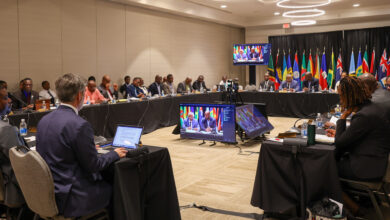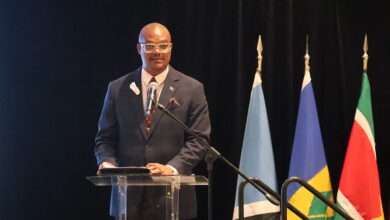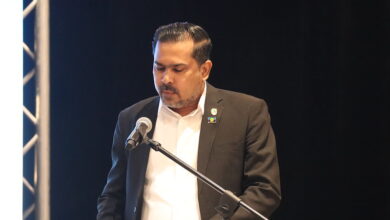(CARICOM Secretariat, Turkeyen, Greater Georgetown, Guyana) His Excellency Ambassador Irwin LaRocque, Assistant Secretary-General Trade and Economic Integration, Caribbean Community (CARICOM) Secretariat has emphasised the urgency for action on food and nutrition security in the Region.
Delivering remarks at the Workshop for the Formulation of a Regional Policy and Food Nutrition Security in the Caribbean on Monday November 30, 2009, in Georgetown, Guyana, Ambassador LaRocque stated, “We must face head on, the challenges of food and nutrition insecurity both at national and regional levels.”
The Workshop was organised by the CARICOM Secretariat with support from the Food and Agriculture Organisation (FAO) of the United Nations (UN), the Government of Italy and the European Commission, as part of the second phase of implementing a CARICOM/CARIFORUM Food Security Policy.
Describing food security as a “fundamental human right,” Ambassador LaRocque stated that recent upsurge of violence in some countries as a result of the latest global food crisis had highlighted the urgency of food security.
“It is inhumane for any person to have to suffer the indignity of having to go without the regular supplies of the appropriate amount of quality food and nutrients required to sustain a healthy life,” he stated.
The Ambassador said that the statistics released by the FAO in 2009 which showed that about one in every four persons in the Caribbean was undernourished, was an “alarming fact” and an indication of the extent of the challenge that gripped the Region.
He said that the challenge had not escaped the attention of the Community, but rather it had encouraged action at the highest political and technical levels.
The Ambassador recalled the Regional Transformation Programme for Agriculture, a decision of the Heads of Government in July 1996, and the Jagdeo Initiative, which seeks to remove key binding constraints to production and trade in competitive agricultural commodities.
He further highlighted the special meeting of CARICOM Heads of Government in December 2007, which sought to find solutions, at both the national and regional levels, to the critical issue of poverty and the rising cost of living.
In addition, the Assistant Secretary-General stated that at the Thirtieth Meeting of the Conference, Heads of Government of the Caribbean Community renewed their “commitment to pursue a strategic approach to transforming the agriculture sector into an internationally competitive sector with increased capacity to contribute to the sustained economic development of the Region, the economic livelihood of entrepreneurs, the rural sector and to food and nutrition security”.
Against that backdrop, he said, there was need for a renewed commitment in pursuit of the goals of food and nutrition security in the Region.
Particularly, he said, there was need to reduce the total food import bill through increased regional content in food consumption, increased use of local inputs into feeds and fertilizers, and increasing the productivity of land, labor and capital in the agricultural sector.
He added that there was also need for increased spending in agriculture focused on rural infrastructure, research and development, agricultural health and food safety, and market information systems.
The influencing of the taste and preference of Regional households to consume nutritionally balanced foods as a means of safeguarding against chronic non-communicable diseases which were prevalent in the Region was also crucial towards achieving the goal of regional food and nutrition security, Ambassador LaRocque noted.
He stated that the CARICOM Secretariat remained committed to coordinating the process of developing a holistic policy position on food and nutrition security for the Community.
“We consider our coordinating role critical as we strive to assist Member States to meet their commitments under the Rome Declaration on World Food Security as well as the Millennium Development Goals, and most importantly to secure the right of each and every national of the Region to have access to adequate, safe and nutritious food required to sustain a healthy life.”
The Ambassador expressed appreciation to the Government of Italy for funding both Phases I and II of the Regional project “Promoting CARICOM/CARIFORUM Food Security”. He also welcomed the commitment of the FAO and other international and regional partners, whom he said, continued to provide support towards rural development, improved agricultural production and productivity, and achieving food and nutrition security.





